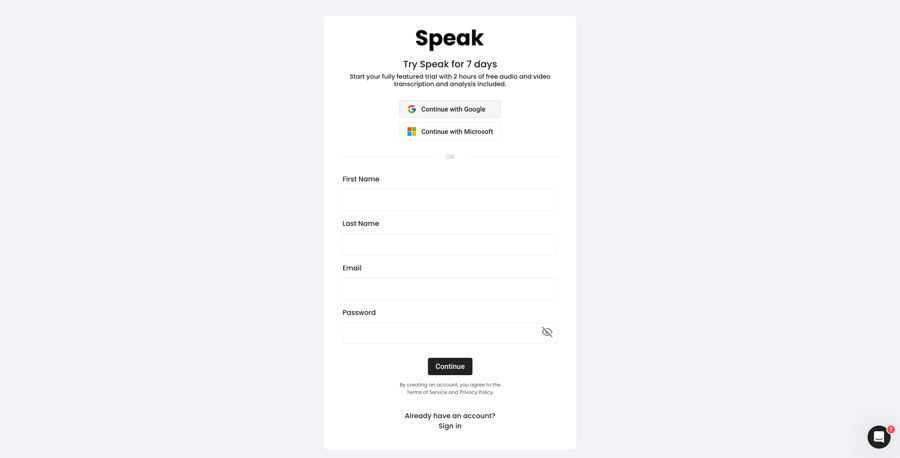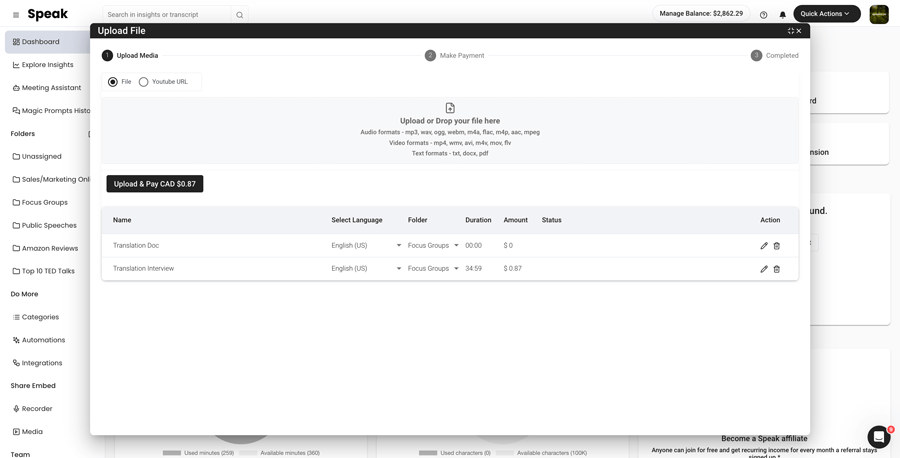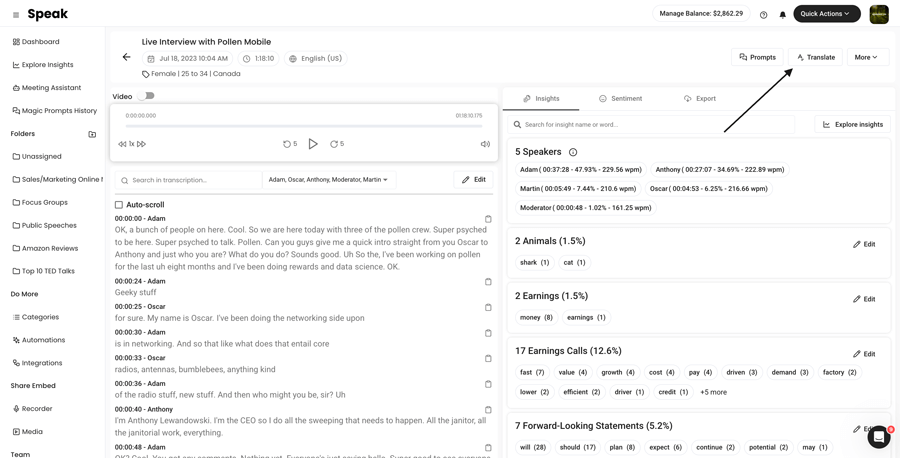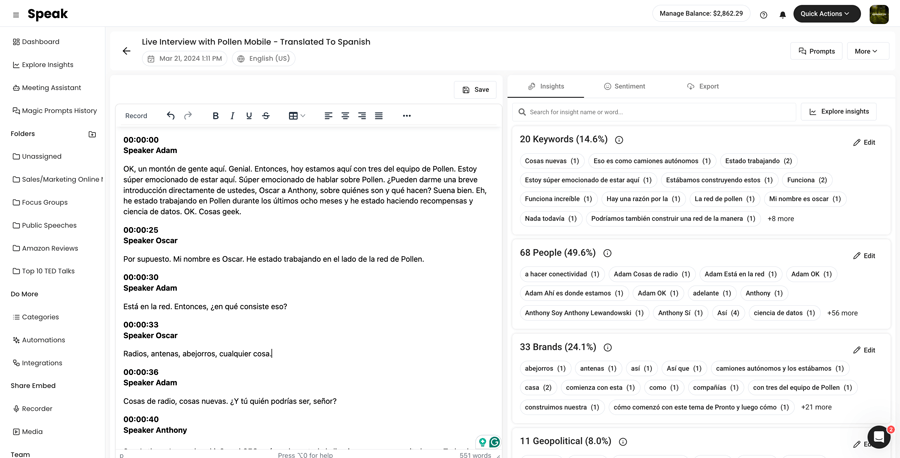How To Translate German to Portuguese
Translating German to Portuguese is super simple!

Step 1: Register for Speak
Register for Speak using this link.
Once you register, you can instantly begin translating your German to Portuguese file(s).

Step 2: Upload Your German file(s)
As soon as you log in, you will be redirected to the dashboard.
Once there, you can select the Quick Action "New Upload".
In Speak, you can seamlessly upload, transcribe and translate audio, video and text files all at once!

Step 3: Translate Your German file(s) to Portuguese
Once the file is uploaded, simply visit your file and select "Translate".
If it is an audio and video file, Speak will ask you if you want to keep the speaker names and timestamps in the translation.
Want to translate many files at once? No problem!
You can view the files you want to automatically translate from German to Portuguese from the folder level and instantly translate as many files as you need with our artificial intelligence translation in just a few clicks.

Step 4: That's It! View, Analyze, Modify & Export Your New Portuguese file(s)
Once the translation is done, you will be alerted and you will see a new document in the same folder your original file is in.
The file will be named the same but with a dash indicating that it is the translated version.
Need support with your German translation?
We are always here and happy to help at Speak!
Just send us a message on live chat on the bottom right corner and we will ensure you are set up for success.
Interested in translating German or other languages to different languages? View our entire list of supported translation languages here.
Automatic, accurate, instant AI translation from German to Portuguese is here for you.
Register for Speak using this link and begin translating German to Portuguese today.
Unlock the Power of Translation: German to Portuguese with Speak AI
In today's globalized world, the ability to communicate effectively across language barriers is more vital than ever before. Whether you're a business looking to expand into new markets, a researcher gathering international data, or simply someone who loves learning new languages, Speak AI's cutting-edge technology offers unparalleled support. Dive into the world of German to Portuguese translation and discover the myriad benefits and fascinating insights this linguistic pairing presents.
The Strategic Edge of German to Portuguese Translation
Germany and Portugal: two countries rich in history, culture, and economic prowess, yet separated by linguistic differences. With the power of AI translation, overcoming these differences has never been easier or more efficient. Speak AI's automatic translation tools, integrating advanced NLP, large language models, data visualization, and Generative AI, are transforming the way we think about language. Here's how:
- Enhanced Communication: Bridge the gap between German and Portuguese speakers, fostering better business relations, academic collaboration, and personal connections.
- Cost and Time Efficiency: Automatic translation drastically reduces the time and expense associated with traditional translation services, enabling swift decision-making and execution.
- Accuracy and Reliability: Leverage Speak AI's 4.9 G2 rating and the trust of over 150K users to ensure your translations are both accurate and contextually relevant.
Be Where the Action Is: German and Portuguese Speakers Worldwide
Understanding the geographical distribution of German and Portuguese speakers illuminates the vast opportunities for communication and engagement. German is not only spoken in Germany but also in Austria, Switzerland, and parts of Belgium and Luxembourg. Portuguese, on the other hand, goes beyond Portugal, being the official language of Brazil, Mozambique, Angola, and several other countries across multiple continents.
Fascinating Linguistic Insights
Delving into the German and Portuguese languages uncovers intriguing facts and features:
- German's grammar is known for its complex cases, while Portuguese is celebrated for its melodious phonetics.
- Both languages have contributed significantly to scientific, philosophical, and literary fields, enriching global cultural heritage.
Speak AI: Pioneering German to Portuguese Translation
At Speak AI, we don't just translate languages; we bridge worlds. Our AI Meeting Assistant effortlessly transcends language barriers by joining calls on platforms like Microsoft Teams, Zoom, Google Meet, and Webex, providing real-time transcription and translation. This capability is especially valuable for businesses and researchers operating in multilingual environments, ensuring no valuable insight is lost in translation.
Practical Applications and Success Stories
From facilitating smoother international business negotiations to aiding researchers in analyzing data from diverse linguistic sources, Speak AI's translation services have been pivotal. Here are some use cases:
- Businesses expanding operations into German and Portuguese-speaking markets have reported increased engagement and sales.
- Academic institutions have leveraged our technology to access a broader range of research materials, enriching their findings.
The Future of Translation: Forward with Speak AI
As we look to the future, the role of AI in translation will only grow, making language barriers a thing of the past. Speak AI is at the forefront of this revolution, constantly enhancing our technology to provide more accurate, natural, and efficient translation services. Whether you're expanding your business, conducting groundbreaking research, or simply exploring new cultures, Speak AI is your partner in navigating the complexities of language.
A Closer Look at German and Portuguese: Stats, Facts, and Features
Understanding the languages of German and Portuguese offers a window into their unique histories, cultures, and global presence. Let's explore further:
Geographical and Demographic Insights
German is predominantly spoken in Central Europe, with Germany's population sitting at over 83 million. In contrast, Portuguese, as the sixth most spoken language globally, has a prominent presence in South America due to Brazil's population of over 211 million. This widespread distribution makes the need for effective translation services not just valuable but essential for global communication and business.
Fun Facts and Linguistic Nuances
German and Portuguese each carry their unique charms and challenges for linguists:
- German words can be notoriously long, creating specific challenges for translation software.
- Portuguese is renowned for its nasal vowels, a feature that lends the language its distinctive sound.
Differences and Similarities: A Linguistic Exploration
While German and Portuguese may seem worlds apart, they share some surprising similarities, such as a rich array of idiomatic expressions. However, their differences, especially in grammar and phonetics, highlight the importance of nuanced, context-aware translation—exactly what Speak AI delivers.
Conclusion: Embrace the Future with Speak AI Translation
In the rapidly evolving global landscape, the ability to communicate across language barriers is invaluable. Speak AI's advanced translation technology, backed by NLP, AI, and machine learning, offers a seamless, efficient way to translate between German and Portuguese. Whether for business, research, or personal growth, Speak AI is ready to support your journey toward truly borderless communication.
Embark on your language translation journey with Speak AI and embrace a world of opportunities awaiting across linguistic horizons. Discover more at our website and join the ranks of those revolutionizing communication one translation at a time.
---
**To answer the questions posed:**
- **Where are German and Portuguese popular?** German is primarily spoken in Germany, Austria, Switzerland, Liechtenstein, and parts of Belgium and Luxembourg. Portuguese, meanwhile, is predominant in Portugal, Brazil, Mozambique, Angola, Guinea-Bissau, East Timor, and Cape Verde. Brazil, with its vast population, marks the largest Portuguese-speaking country.
- **Interesting stats on countries, populations, and history:** German is spoken by approximately 100 million native speakers and is the EU's most spoken native language. Portuguese boasts about 258 million speakers globally, making it the world's sixth most spoken language. Both languages have roots in the Indo-European language family, with German stemming from the Germanic branch and Portuguese from the Romance branch.
- **Fun facts about German and Portuguese:** German has a reputation for long, compound words, such as "Rindfleischetikettierungsüberwachungsaufgabenübertragungsgesetz," meaning beef labeling supervision duties delegation law. Portuguese, on the other hand, has two official written standards: European Portuguese and Brazilian Portuguese, reflecting the language's rich cultural diversity.
- **Differences and similarities between German and Portuguese:** German and Portuguese vastly differ in grammar, phonetics, and syntax. German possesses four noun case endings, while Portuguese uses verbal conjugations extensively. Despite these differences, both languages express a rich cultural heritage through literature, music, and art, highlighting the importance of accurate, nuanced translation to share and appreciate this heritage globally.
Translate German To These Other Supported Languages:
- Translate German-to-Arabic (Egypt)
- Translate German-to-Arabic (Iraq)
- Translate German-to-Arabic (Israel)
- Translate German-to-Arabic (Jordan)
- Translate German-to-Arabic (Kuwait)
- Translate German-to-Arabic (Lebanon)
- Translate German-to-Arabic (Oman)
- Translate German-to-Arabic (Palestinian Authority)
- Translate German-to-Arabic (Qatar)
- Translate German-to-Arabic (Saudi Arabia)
- Translate German-to-Arabic (Syrian Arab Republic)
- Translate German-to-Arabic (United Arab Emirates)
- Translate German-to-Arabic Modern Standard (Bahrain)
- Translate German-to-Armenian
- Translate German-to-Bulgarian
- Translate German-to-Catalan
- Translate German-to-Chinese (Cantonese, Traditional)
- Translate German-to-Chinese (Simplified)
- Translate German-to-Chinese (Traditional)
- Translate German-to-Croatian
- Translate German-to-Czech
- Translate German-to-Danish
- Translate German-to-Dutch
- Translate German-to-English
- Translate German-to-English (Australia)
- Translate German-to-English (India)
- Translate German-to-English (Ireland)
- Translate German-to-English (New Zealand)
- Translate German-to-English (Scottish)
- Translate German-to-English (South African)
- Translate German-to-English (United Kingdom)
- Translate German-to-English (United States)
- Translate German-to-Estonian
- Translate German-to-Farsi
- Translate German-to-Finnish
- Translate German-to-French
- Translate German-to-French (Canada)
- Translate German-to-German
- Translate German-to-German (Swiss)
- Translate German-to-Greek
- Translate German-to-Gujarati
- Translate German-to-Hebrew
- Translate German-to-Hindi
- Translate German-to-Hungarian
- Translate German-to-Icelandic
- Translate German-to-Indonesian
- Translate German-to-Irish
- Translate German-to-Italian
- Translate German-to-Japanese
- Translate German-to-Kannada
- Translate German-to-Korean
- Translate German-to-Latvian
- Translate German-to-Lithuanian
- Translate German-to-Malay
- Translate German-to-Malayalam
- Translate German-to-Norwegian
- Translate German-to-Persian
- Translate German-to-Polish
- Translate German-to-Portuguese
- Translate German-to-Portuguese (Brazilian)
- Translate German-to-Portuguese (Portugal)
- Translate German-to-Romanian
- Translate German-to-Russian
- Translate German-to-Slovak
- Translate German-to-Slovenian
- Translate German-to-Spanish
- Translate German-to-Spanish (Mexico)
- Translate German-to-Swedish
- Translate German-to-Tamil
- Translate German-to-Telugu
- Translate German-to-Thai
- Translate German-to-Turkish
- Translate German-to-Ukrainian
- Translate German-to-Vietnamese



